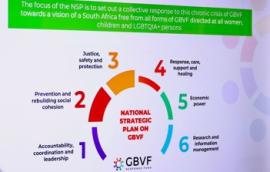
Minister in the Presidency for Women, Youth and Persons with Disabilities, Sindisiwe Chikunga, has called for a “more deliberate partnership” between government and the Gender-Based Violence and Femicide (GBVF) Response Fund.
Delivering remarks during a recent meet and greet with the leadership of the GBVF Fund, held in Sandton, Gauteng, the Minister stressed the need for shared responsibility and a unified commitment to justice in the national fight against GBVF.
“Let today mark the beginning of a more deliberate partnership, one rooted in shared responsibility, mutual respect, and an unwavering commitment to justice,” Chikunga said.
Commending the Fund for its efforts in mobilising and distributing resources to frontline GBVF initiatives, the Minister underscored the need for deeper alignment between state-led and civil society efforts.
The fund has so far reached 772 244 people across the country.
“We commend the GBVF Response Fund for the strides it has made in mobilising and disbursing resources to frontline initiatives. This is vital work, and we acknowledge the dedication and effort it entails.
“At the same time, we believe this is a critical moment to strengthen alignment. As government, we are committed to ensuring that our respective efforts reinforce one another, that we close systemic gaps, scale local innovation, and ensure that survivors across all communities are supported with care and dignity,” she said.
The engagement brought together Fund executives, including Interim CEO Zanele Ngwepe and Chairperson of the Board Faith Khanyile, alongside officials from the Ministry and Department of Women, Youth and Persons with Disabilities.
Chikunga warned that gender-based violence and femicide remain a national and global human rights crisis, citing alarming statistics.
“The situation in South Africa is dire. In just three months — January to March 2025 — the South African Police Service recorded 969 women murdered, over 11,000 rape cases, and close to 15,000 assault cases against women. Each of these numbers is a tragedy [and] a call to action,” the Minister emphasised.
She stressed that violence continues to occur where women should feel safest, in homes, workplaces, and places of worship and highlighted the added vulnerability of women with disabilities who often face sexual violence with little access to justice.
“This means there are women who cannot see, hear, or speak — who are subjected to brutality and have little to no access to justice. These are the hidden faces of gender-based violence and femicide,” she said.
Chikunga reiterated South Africa’s commitment to the National Strategic Plan on GBVF, describing it as “a country plan driven by survivors, community leaders, civil society, and the public.” The Ministry is also leading South Africa’s chairmanship of the G20 Empowerment Working Group this year, placing GBVF firmly on the international agenda.
Highlighting institutional progress, she announced that the Inter-Ministerial Committee on GBVF and Substance Abuse, co-chaired with Social Development Minister Sisisi Tolashe, has been approved by Cabinet and is already operational.
She also confirmed that the long-awaited National Council on GBVF will be formally established by April 2026.
“This Council will serve as the institutional anchor for coordination, accountability, and funding — ensuring that the implementation of the National Strategic Plan is survivor-centred, agile, and sustained beyond political cycles,” she said.
Other key interventions include the launch of the National GBVF Dashboard to track progress in real time, the expansion of Thuthuzela Care Centres, and the implementation of 100-Day Challenge models in communities — an initiative bringing together local police, prosecutors, health workers, and social services to tackle specific GBV issues with speed and collaboration.
The Minister invited the Fund to contribute to ongoing policy efforts, including the finalisation of the Women Empowerment and Gender Equality (WEGE) Bill, which seeks to strengthen mechanisms for eliminating gender discrimination across all sectors.
While acknowledging the resource constraints faced by her department, Minister Chikunga affirmed her team’s commitment.
“This work is not easy. But it is a non-negotiable because there can be no freedom, no peace, and no economic justice where women, girls, persons with disabilities and Lesbian, Gay, Bisexual, Transgender, Queer, Intersex, and Asexual (LGBTQIA+) individuals live in fear,” she said.
The Minister concluded by expressing hope that the meeting would lay the groundwork for enhanced cooperation with the Fund, in pursuit of a South Africa free from gender-based violence and femicide. – SAnews.gov.za


